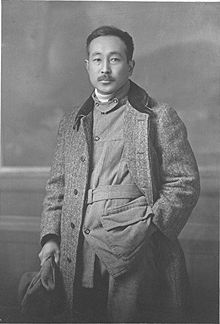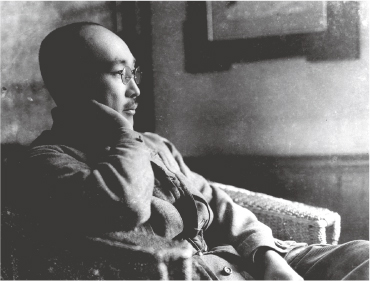Takeo Arishima
Arishima Takeo (Japanese有 岛 武 郎, born March 4, 1878 in Tokyo, † June 9, 1923 in Karuizawa ) was a Japanese writer, who was influenced by the " humanistic " Shirakaba oriented group, but due to his training and his socio-political interest soon occupied a special position. For Stephen W. Kohl, he was "probably the most brilliant and enigmatic member" (probably the most brilliant and enigmatic member) of Shirakaba. With 45 Takeo committed suicide together with a lover.
Life and work
The son of a former samurai and wealthy businessman from Tokyo visited the first agricultural college in Sapporo ( Sapporo nōgakkō, now part of the University of Hokkaido ). In 1901 he converts to Christianity. During a further study (of 1903-06 ) at Harvard University in the U.S., however, he suffers a crisis of faith and turns, impressed by writings of Walt Whitman, Henrik Ibsen and Pyotr Alexeyevich Kropotkin, the socialism. After returning to Europe after a year in Japan, Takeo is an English teacher and founded with two other authors - Shiga Naoya and Mushanokoji Saneatsu - the literary magazine Shirakaba ( White birch ), which holds up to 1923. She feels both the young Japanese naturalism as the modern "western" influences connected. According Sybille Altmann has been a " key element " of the Japanese literary and artistic life in the 13 years of its existence. Takeo also appear first in their narratives.
1910 marries Takeo; his wife dies but six years later, leaving him three small children. His first novel, Cain no Matsuei ( Descendants of Cain ) of 1916 is a lot of attention. Other spectacular steps to follow nichtliterarischem terrain. 1922 transmits Takeo inherited a vast land at the foot of the mountain Yotei to people who are planning to order it collectively. He accompanied this waiver with the essay Jengen hitotsu ( A Manifesto ), in which he explicitly committed to socialism, though he emphasized that his class origin allow him in the battle for a leading role. On this estate near the small town of Niseko (in the south of the northernmost peninsula of Japan Hokkaidō located ) in 1977 (on the occasion of the 100th birthday of the founder ) built the Arishima Takeo Memorial Museum, which, according to local website an important role in the promotion and dissemination of the regional culture plays.
1922 Takeo learns to know the journalist Hatano Akkiko, a married woman. The extramarital love relationship between the two leads ( in Takeo's villa in Karuizawa ) for double suicide the following year. Oddly enough, it was in 1919 Takeo's also acclaimed novel A woman ahead, which is the failure of a woman who lives outside of social conventions. And even during his student days in Sapporo, it says Takeo tried together with a lover ( Morimoto Kokichi ) to take his life.
Arishimas younger brothers, the painter Arishima Ikuma and the writer Satomi were sound.
Works
- German "triumph", translated by B. Matsumoto, in: stories and tales from Japan, 1950, pp. 143-155








